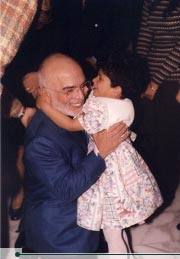 |
Keys
to the Kingdom National Anthem The Office Human Resources |
Jordan has consistently been cited by Amnesty International as the country with the best human rights record in the region. This not only reflects the philosophy of the Hashemites, but also speaks for the abilities and personal qualities of Jordan's monarch. To have maintained the Kingdom’s stability over the past forty years, in an area of the world not commonly known for its tranquility, is one of His Majesty the late King Hussein's greatest achievements. To have done so principally through persuasion, not coercion, has made this feat even more remarkable. Within Jordan, the people have responded favorably to the liberal human rights agenda promoted by King Hussein and Prince El Hassan. Article 16 of the National Charter specifies a commitment on the part of Jordan's body politic to protect human rights and to adhere to the United Nations Universal Declaration of Human Rights. In 1989, the Jordanian government signed the UN Convention Against Torture and Other Cruel and Inhuman or Degrading Treatments or Punishments. To ensure transparency and accountability, local and international human rights groups are allowed to investigate allegations of human rights abuses and can publish and disseminate findings critical of government policy. The International Committee of the Red Cross is granted permission to visit prisoners and assess the condition of security detainees. Moreover, local groups such as the Arab Organization for Human Rights and the Peace Center for Humanitarian Studies are registered with the government and have raised human rights cases with government officials. |
|
|
Jordan’s constitution protects women by explicitly stating that all Jordanians are equal before the law, have the right to assume public office and the right to work. In 1974, women were given the right to vote and the right to run in general elections. In September 1996, a National Committee for Women was formed in order to formulate general policies related to women in all fields. The committee also defines the priorities, charts plans and programs for women in both the governmental and non-governmental sectors. In June 1996, working mothers were provided with additional legal protection. The new labor law that went into effect includes an article that prohibits employers from terminating their jobs or giving them notice about termination if they are past their sixth month of pregnancy or on maternity leave. It also gives mothers ten weeks of paid maternity leave, compared with the previous allowance of eight weeks, as well as an hour a day for breast-feeding during the first year after delivery and a year’s unpaid leave to care for their newborns. |
|
|
Workers in the private sector and in some state-owned companies have the right to establish and join unions, although unions must be registered to be considered legal. Over 30 percent of the work force is organized into seventeen unions, which comprise the General Federation of Jordanian Trade Unions. The Constitution prohibits anti-union discrimination, and unions exercise their right to bargain collectively. Labor disputes are usually resolved through mediation or arbitration, and during this time strikes are prohibited. If a settlement cannot be reached through mediation, the Ministry of Labor may refer the dispute to an industrial tribunal by the agreement of both parties. If only one party agrees, the Ministry of Labor refers the dispute to the cabinet and then to Parliament. Labor law prohibits employers from dismissing a worker during a labor dispute. Jordanian law prohibits most workers from working more than the customary 48 hours a week, and 54 hours for hotel, restaurant and cinema employees. Employees are entitled to one day off each week, and workers may not work more than 16 hours in any continuous period or more than 60 hours’ overtime per month. |
|
|
The government is committed to ensuring the rights of children. Education is free for all primary and secondary school students and compulsory until age 15, and corporal punishment in schools is prohibited. Jordanian labor laws prohibit children under the age of 16 from working except as apprentices, who at age 13 may begin part-time training for up to six hours per day. Poverty has contributed to the problem of child street peddlers, and the Ministry of Social Development has formed a committee to address the problem. In most cases, the children are removed from the streets, returned to their families or to juvenile centers, and their families are sometimes provided with a monthly stipend. |
|
|
The effort to improve living conditions for Jordan’s orphans was led personally by His Majesty the late King Hussein. In March 1997, after a surprise visit to a home for orphans, King Hussein was moved by the children’s living conditions. He immediately announced his donation of Hashmiya Palace to be a new home for the orphans he had just visited. King Hussein assigned his daughter, Princess Zein, the responsibility of running the new orphanage at Hashmiya. The palace was renamed "Dar al-Bir" (Home of Piety). Jordanians from all walks of life are donating their time and money to help this and other homes for the orphans. |
 His Majesty King Hussein holding a child at the Dar al-Bir Orphanage, December 2, 1997 |